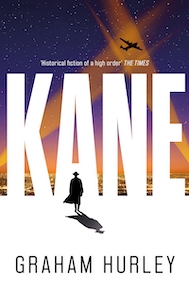Kane, the latest title in the Spoils of War series, was always going to be a fabulous challenge. ‘You’re in double figures, said Head of Zeus CEO Nic Cheetham. This is Book Ten. Let go. Enjoy yourself. Blockbuster time. See where it takes you.’

And so I did. It’s the first week of December 1941. In the opening pages we find ourselves in Washington DC enjoying the watchful company of a Secret Service agent charged with keeping the man on everyone’s lips in one piece. That man? Third-time President Franklin D. Roosevelt. The key location? District Sixteen, Secret Service code for the White House. The enemy so suddenly at the gates? Japan.
As a writer, you run with the boldness of the idea and the beckoning lure of the lead characters. They write the script and you – plus hopefully an army of readers – follow. So welcome to the world of Secret Agent Quincy Kane, of his laconic buddy Gus Leaman, and of LA Times reporter Lou Mahoney. All three have shared years together out in California. Kane and Mahoney are still locked in a passionate arm’s-length affair.
So far, so good, but on an otherwise quiet Sunday morning in Hawaii waves of Japanese bombers appear from nowhere, descend on Pearl Harbour and maul the Pacific Fleet. Thousands die. America is suddenly at war. No one in Washington can quite believe it. In the shape of Kane, Mahoney has a direct line into White House thinking and takes the next plane east. A tap on Kane’s door. A night in bed. Indiscretions galore.
In my experience, which is in danger of becoming extensive, books depend on research. Every corner of the world and the characters you create have to be authentic. So how much did I know about the small print of life in the 1941 White House? Nothing. About what it might have been like to serve a figure like Roosevelt? Nada. About the minute-by-minute shock and chaos that greeted the news from Pearl? Niente.
And so I’m faced once again with the strange challenge tossed my way by every book in the Spoils of War series: how to make all your fictional characters both compelling and lifelike, while paying equal respect to the real giants of a war that refuses to leave us alone. In their very separate ways, Roosevelt, Churchill, Stalin and Hitler- along with dozens of slightly lesser man – must come alive on the page. And that has meant, from the start of the series onwards, paying minute attention to a pile of autobiographies, diaries, letters, reminiscences, and invaluable third person accounts, as well as the treasure trove of newsreel and stills that briefly reveal a man through the priceless clues of body language.
Take FDR. His entire life came, literally, to a halt after polio left him paralysed below the waist in early middle age. Yet he worked ceaselessly to overcome the handicap and it was news to millions of Americans that there was ever anything wrong with him. Look hard at the Movietone footage from 1941 and you can see the tell-tale stiffness in movements that we all take for granted yet this legend, with his charm, and his arm round the shoulder, and the intimate come-hither of his fireside radio chats, hauled countless millions out of the poverty and despair of the Depression and put America back on its feet.
So what did Kane make of him given daily close-up access? And how come this ex-Boston PD cop becomes an FDR favourite? It’s questions like this that the Spoils of War must answer, and no one writing novels like these can afford to have readers settling for anything but 100% buy-in. In other words the joins between the real and the make-believe, in terms of character, must be seamless.
The plot of Kane is driven by the chemistry of the three lead characters, played out against the often chaotic background of a nation so suddenly – and so unexpectedly – at war. And the drumbeat of events in both Quincy Kane’s personal and professional lives leads very quickly to the West Coast, and to Los Angeles. A previous career making TV documentaries had given me a passing knowledge of LA but the city has always been a plaything of the movies, brief flickers of real life beneath the gaudy carnival of showbiz Hollywood, so what was the City of Angels really like when it braced itself for invasion by the marauding Japs in the dying weeks of 1941?
The answer, once again, lies in cold print. What the archive of papers like the LA Times can tell us. Ditto the novels of Raymond Chandler and James M. Cain plus a torrent of notes from the pens of countless other observers. Over all this testimony lies Hollywood’s own version of itself, yet more voices raised as West Coast America realises that this war is here to stay. Life in LA has always been a little too fanciful and intense to be true. No longer. Tens of thousands of Japanese – many with citizenship – trucked away to makeshift camps in the desert. Roadblocks manned by armed guards. Foodstuffs hoarded. Folk looking nervously seaward. The movies overtaken by real life.
And so Kane, attended by a sequence of events that take him ever-closer to a personal reckoning, must make his way across a landscape at once familiar to all of us, and yet wholly foreign. America suffered a brief but chaotic nervous breakdown in the immediate aftermath of the attack on Pearl Harbour. That single event upset every image so carefully built of a nation at last at peace with itself. In God’s name, what next?
For the writer dealing in historical fiction, the perfect question. Read on....

‘Kane’ by Graham Hurley is published by Head of Zeus on 19th June at £20
SHOTS would like to thank Sophie Ransom of Ransompr, Head of Zeus for organising this feature and, of course, Graham Hurley for writing it.
© 2025 Graham Hurley - Visit his website